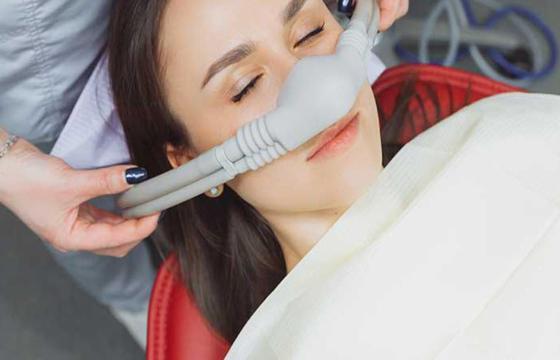Sedation
Sedation is commonly used in dentistry for patients who have a fear of dentists, have difficulties sitting still for lengthy periods of time, or require prolonged operations. It can contribute to a more positive and comfortable experience for the patient while also allowing the dentist to conduct the essential treatment safely and efficiently.

What is Sedation
Sedation is a medical method that induces relaxation, serenity, and, in certain cases, unconsciousness in patients. It is often utilized in a variety of medical and dental procedures to make patients feel more at ease and relieve anxiety or discomfort.
How long time takes of Sedation Process
During dental treatments varies according to the kind utilized. Nitrous oxide, which is administered throughout the procedure, wears off quickly once stopped, typically taken an hour before the appointment, can last for hours, causing drowsiness after the procedure; intravenous (IV) which provides rapid onset and precise control, can last several hours with patients monitored until fully alert.
Types
There are numerous ways to deliver anesthesia in dentistry:
Nitrous oxide, sometimes known as laughing gas, is a moderate sedative that is delivered by a mask put over the nose. It creates a mood of relaxation and bliss while keeping the patient awake and receptive. Nitrous gas is frequently utilized for patients experiencing mild to severe dental anxiety or for uncomplicated treatments.
Oral Sedation: Oral sedatives are administered in the form of a tablet or liquid before to the dental operation. These drugs can be mild to strong sedatives, depending on the amount and kind of medication taken. Produces a deeper level of relaxation than nitrous gas and is commonly used for individuals with moderate to severe dental anxiety or for lengthier treatments.
Intravenous (IV) is the injection of sedative drugs directly into the circulation via a vein. This approach provides exact control over the degree and can create a deeper level of relaxation or coma as required. IV is typically utilized for difficult or surgical treatments, as well as for individuals suffering from severe dental fear.
Benefits
Reduced Anxiety: One of the main advantages in dentistry is its ability to reduce dental anxiety and dread. Makes patients feel more at ease and comfortable during dental procedures, frequently resulting in a more favorable experience.
Increased Comfort: can help patients relax their muscles and reduce pain during dental operations. This is especially useful for individuals who have a sensitive gag reflex, TMJ issues, or difficulties sitting still for extended periods of time.
Improved Treatment Outcomes: keeps patients comfortable and cooperative throughout dental operations, dentists may execute treatments more efficiently and effectively. This can improve treatment outcomes and decrease the need for additional sessions.
Time Efficiency: enables dentists to complete more tasks in a single session, decreasing the need for numerous appointments for difficult or lengthy treatments. This is especially useful for patients who have hectic schedules or are traveling from a distance.
Is safe?
When performed by skilled and experienced dental professionals, is regarded safe and successful for the majority of patients. However, dentists must undertake a comprehensive examination of the patient's medical history and overall condition before suggesting. Additionally, patients should follow their dentist's pre- and post-operative recommendations to ensure a safe and effective experience.
Sedation vs. Anesthesia: Selecting the Best Approach
Two independent ways for improving patient comfort and safety during medical and dental operations. Produces relaxation and anxiety reduction while keeping awareness; it is commonly used for minor operations or mild to moderate anxiety. Anesthesia, on the other hand, causes controlled unconsciousness, removing all awareness and feeling; it is usually used for major operations or treatments that need full immobility. The decision between sedation and anesthesia is determined by the nature of the treatment, the patient's medical history, and their preferences. Understanding these distinctions enables people and healthcare professionals to make more informed decisions for better results.
Frequently asked questions about Sedation
*The treatment pages provided on this platform are intended for informational purposes only and do not constitute medical or dental advice, diagnosis, or treatment recommendations. The information presented on these pages is not a substitute for professional medical or dental advice from qualified healthcare providers.
*By accessing and using the treatment pages on this platform, you acknowledge and agree to the terms of this disclaimer. If you do not agree with these terms, please refrain from using the treatment pages.